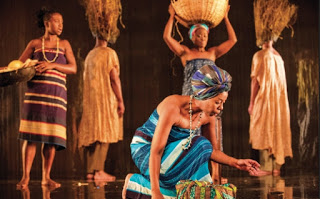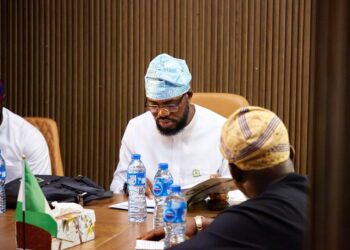
I have never hidden the fact that I am a proud Yoruba person who appreciates the cultural richness of the Yoruba people. For instance, I have been fascinated, right from my youth, about the accommodating capacity and the republican pedigree of the Yoruba and how this was demonstrated within the tiny geographical confines of Aáwé.
This, in a manner that brings to light the seamless interwoven matrix that Ali Mazrui calls Africa’s ‘triple heritage’ of the traditional, the Islamic and the Judeo-Christian.
I have a strong belief that my ecumenical temperament derives from the Yoruba upbringing at Aáwé which enabled me to sample the best of Islam, Christianity and traditional cultural manifestations.
My grandfather was a Christian, my grandmother a Moslem, and Aáwé was solidly traditional. It was therefore possible for me to connect with my Moslem cousins during Ramadan, attend church and appreciate the cultural essence of the Egungun festival.

This my fascination with the Yoruba culture has grown over time, sufficiently enough for me to follow avidly its underpinnings in the unfolding of Yoruba politics, development and progress within the confines of Nigeria.
I am equally patriotic a Nigerian enough not to be assailed by the possibility of a dissonance between my Yoruba beingness and my nationality as a Nigeria. On the contrary, I am actually convinced that the Yoruba and their South-West configuration have a significant role to play in the transformation of the Nigerian governance framework.
All my arguments for reform and restructuring have been directed towards enunciating this conviction of the indivisible relationship between the Yoruba and the future of Nigeria. Recently, I have reflected on the future of the Yoruba in Nigeria.
This is why I became extremely interested and intellectually tickled when I heard a beautiful Ewi poetry recitation by Pastor Adekunle Steven Adedeji, popularly known as Kunle Omo Alaafin Orun.
Anyone hearing this poetry rendition, especially the first lines, and not familiar with the oeuvre of Omo Alaafin Orun would immediately put him in the same patriotic context with the great Ewi exponent, Lanrewaju Adepoju.
That comparison would be both right and wrong. It would be right because the recitation has the same scintillating vocal acrobatic flowing from a magisterial mastery of the Yoruba language, idioms and proverbs.
The comparison is equally right because both ewi poets are concerned with the state and future of the Yoruba people. But the comparison breaks down immediately the rendition proceeds to a certain point and it becomes obvious that Kunle Omo Alaafin Orun is a Redeemed Christian Church of God (RCCG) pastor. This is not a bad thing at all.
In fact, it just makes the poetry rendition all the more intriguing and compelling. It is a mesmerizing oral poem that demands reflection through its sonorous weaving of Yoruba history, research, Christian theology and Yoruba cultural evolution. In summary, Omo Alaafin Orun makes a case for an urgent change of name from “Yoruba” to “Omoluwabi.”
He then went on to weave a historical trajectory that places the Yoruba at a Coptic juncture which made Yoruba historical origin entirely Christian, and the justification for a renaming.
Omo Alaafin Orun commences the poetry rendition with an elegant but insistent account of his research which, according to him, not only revealed that the concept of “Yoruba” did not emanate from the Yoruba themselves but is a name external to us. But more importantly, his research supposedly revealed that the term “Yoruba” came from a Hausa corruption—Yariba, as a shorter form of Yaribanza or a “bastard” or “sons of bastard.” This corrupted name has stayed with us for all of history, and, for him, has become responsible for our ill-fortune for that long too.
The case is simple: a name is potent because it seems to outline a person’s or community’s destiny. The Yoruba have a very strong belief in destiny, predestination and the significance of names and naming.
Thus, the name a person bears becomes a signifier of the person’s lot in life. Thus, if a person’s lot in life has become terrible, one of the first places to commence a corrective measure is the name the person bears.
A properly researched history of the Yoruba, he argues, provides a different trajectory that could lead to the upturning of the Yoruba lot and transform our fortune as a people who have been blessed not only with a deep cultural heritage but who also have a deep and hitherto unknown connection to the God of Christianity. The proper history of the Yoruba, according to Kunle Omo Alaafin Orun, did not begin in Mecca.
In fact, that revisionist tendency has an ideological content that is meant to exploit the Yoruba within an Arab/Islamic hegemony. On the contrary, the Yoruba migrated from Nubia via Egypt where they were integrated into a Coptic Christian practice left by St. Mark of the Gospel.
The worship of the Orisa that now seems to mark Yoruba religion, for him, was a function of having lost the way and the light of Christianity when historical adversity drove the Yoruba from Nubia.
There is a possibility that this historically serious and theologically insistent poetry rendition could be dismissed by a lot of people. In fact, it was that dismissive and derisive tone that jumpstarted the long list of comments on the Ewi video on YouTube. But then derision is the wrong way to respond to such a carefully thought out appeal and admonition.
First, we need to get a clear picture of the message Kunle Omo Alaafin Orun threw out to us all: It seems we have been looking in the wrong places for the source of the Yoruba predicament.
Why should we not consider the source of our name? And this is an inquiry that is consistent with Yoruba ontology too, especially with regards to names and destiny.
A similar account of the Yoruba came from the allegation that Alaafin Aole placed a curse on the Yorùbá race. Why is this diagnosis and recommendation worse than that other? And this one came with a recommendation: Changing our name from Yoruba to Omoluwabi.
This is a revolutionary recommendation, more so that it is linked to a theological background in Christianity. But this is not less inspiring even if it is spurious.
The above article was written by Dr. Olaopa, the Executive Vice-Chairman, Ibadan School of Government & Public Policy (ISGPP)









